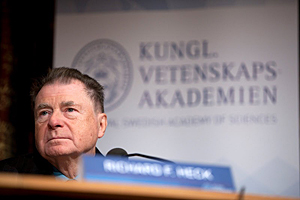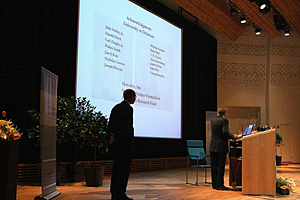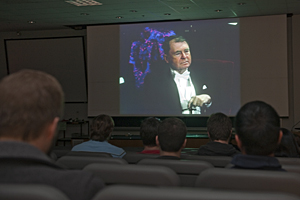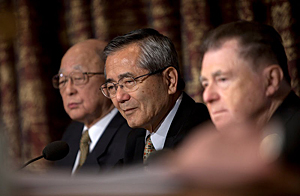


ADVERTISEMENT
- Rozovsky wins prestigious NSF Early Career Award
- UD students meet alumni, experience 'closing bell' at NYSE
- Newark Police seek assistance in identifying suspects in robbery
- Rivlin says bipartisan budget action, stronger budget rules key to reversing debt
- Stink bugs shouldn't pose problem until late summer
- Gao to honor Placido Domingo in Washington performance
- Adopt-A-Highway project keeps Lewes road clean
- WVUD's Radiothon fundraiser runs April 1-10
- W.D. Snodgrass Symposium to honor Pulitzer winner
- New guide helps cancer patients manage symptoms
- UD in the News, March 25, 2011
- For the Record, March 25, 2011
- Public opinion expert discusses world views of U.S. in Global Agenda series
- Congressional delegation, dean laud Center for Community Research and Service program
- Center for Political Communication sets symposium on politics, entertainment
- Students work to raise funds, awareness of domestic violence
- Equestrian team wins regional championship in Western riding
- Markell, Harker stress importance of agriculture to Delaware's economy
- Carol A. Ammon MBA Case Competition winners announced
- Prof presents blood-clotting studies at Gordon Research Conference
- Sexual Assault Awareness Month events, programs announced
- Stay connected with Sea Grant, CEOE e-newsletter
- A message to UD regarding the tragedy in Japan
- More News >>
- March 31-May 14: REP stages Neil Simon's 'The Good Doctor'
- April 2: Newark plans annual 'wine and dine'
- April 5: Expert perspective on U.S. health care
- April 5: Comedian Ace Guillen to visit Scrounge
- April 6, May 4: School of Nursing sponsors research lecture series
- April 6-May 4: Confucius Institute presents Chinese Film Series on Wednesdays
- April 6: IPCC's Pachauri to discuss sustainable development in DENIN Dialogue Series
- April 7: 'WVUDstock' radiothon concert announced
- April 8: English Language Institute presents 'Arts in Translation'
- April 9: Green and Healthy Living Expo planned at The Bob
- April 9: Center for Political Communication to host Onion editor
- April 10: Alumni Easter Egg-stravaganza planned
- April 11: CDS session to focus on visual assistive technologies
- April 12: T.J. Stiles to speak at UDLA annual dinner
- April 15, 16: Annual UD push lawnmower tune-up scheduled
- April 15, 16: Master Players series presents iMusic 4, China Magpie
- April 15, 16: Delaware Symphony, UD chorus to perform Mahler work
- April 18: Former NFL Coach Bill Cowher featured in UD Speaks
- April 21-24: Sesame Street Live brings Elmo and friends to The Bob
- April 30: Save the date for Ag Day 2011 at UD
- April 30: Symposium to consider 'Frontiers at the Chemistry-Biology Interface'
- April 30-May 1: Relay for Life set at Delaware Field House
- May 4: Delaware Membrane Protein Symposium announced
- May 5: Northwestern University's Leon Keer to deliver Kerr lecture
- May 7: Women's volleyball team to host second annual Spring Fling
- Through May 3: SPPA announces speakers for 10th annual lecture series
- Through May 4: Global Agenda sees U.S. through others' eyes; World Bank president to speak
- Through May 4: 'Research on Race, Ethnicity, Culture' topic of series
- Through May 9: Black American Studies announces lecture series
- Through May 11: 'Challenges in Jewish Culture' lecture series announced
- Through May 11: Area Studies research featured in speaker series
- Through June 5: 'Andy Warhol: Behind the Camera' on view in Old College Gallery
- Through July 15: 'Bodyscapes' on view at Mechanical Hall Gallery
- More What's Happening >>
- UD calendar >>
- Middle States evaluation team on campus April 5
- Phipps named HR Liaison of the Quarter
- Senior wins iPad for participating in assessment study
- April 19: Procurement Services schedules information sessions
- UD Bookstore announces spring break hours
- HealthyU Wellness Program encourages employees to 'Step into Spring'
- April 8-29: Faculty roundtable series considers student engagement
- GRE is changing; learn more at April 15 info session
- April 30: UD Evening with Blue Rocks set for employees
- Morris Library to be open 24/7 during final exams
- More Campus FYI >>
2:12 p.m., Dec. 10, 2010----With proud friends and colleagues looking on from campus via webcast, the University of Delaware's Richard F. Heck received the 2010 Nobel Prize in Chemistry on Friday, Dec. 10, at the Stockholm Concert Hall.
Heck, the Willis F. Harrington Professor Emeritus in the Department of Chemistry and Biochemistry, was honored with the Nobel Prize in Chemistry alongside fellow researchers Akira Suzuki of Hokkaido University in Sapporo, Japan, and Ei-Ichi Negishi of Purdue University.
The scientists were cited “for palladium-catalyzed cross couplings in organic synthesis,” and they will share a $1.5 million award.
According to the Nobel statement, the scientists were honored for discovering “more efficient ways of linking carbon atoms together to build the complex molecules that are improving our everyday lives.”
The laureates were presented their Nobel Prizes by King Carl XVI Gustaf of Sweden during the stately ceremony.
"This is truly a memorable day for the University of Delaware as we celebrate one of our own, Richard Heck, on his receipt of the 2010 Nobel Prize in Chemistry," said UD President Patrick Harker. "We congratulate Prof. Heck on his fine work, for which he has been recognized with one of the world's highest honors."
About 50 people gathered on Friday morning in Room 101 of Brown Laboratory, home of the Department of Chemistry and Biochemistry, to watch the Nobel ceremony and to celebrate Heck's selection.
The award presentations were marked by pomp and ceremony that included the presence of the king and the royal family and music by the Royal Philharmonic Orchestra. Each time the camera focused on Heck, the audience in Brown Lab responded with a resounding round of applause, especially when Heck, as the first of the three honorees in chemistry, stepped forward to receive the award.
Douglass F. Taber, professor of chemistry and biochemistry, said “honoring Heck was the right thing to do, especially as the work of the co-honorees followed on the path set down by Heck. I'm grateful that he was recognized. He was the first guy to discover a more efficient way of linking carbon atoms together to build complex molecules.”
Taber said he communicates with Heck, who now lives in the Philippines, “by snail mail, because that is what he prefers. We do this about three to four times a year. It's interesting now; it is a big thing for Dick to go out and get his mail, but here he is going around the world to Sweden to receive the Nobel Prize in Chemistry.”
Taber said his students “were pretty excited about this, about the fact that the very best chemistry in the world was done at the University of Delaware. It is a great distinction, and it has inspired our students to do the very best chemistry there is.”
This week, the University's Board of Trustees voted to award Heck an honorary degree, which will be conferred during Commencement on May 28, 2011.
He also will be on campus with co-Laureate Ei-Ichi Negishi that month to discuss the implications of their work in palladium-catalyzed cross-couplings.
About Heck's work
Fellow chemists praised the selection and cited the importance of Heck's work in the field.
“The award of the Nobel Prize in Chemistry for discoveries of palladium catalysis for the construction of organic molecules was overdue,” said Prof. E.J. Corey of Harvard University, who was awarded the Nobel Prize in Chemistry in 1990. “The delay may have been a consequence of the multifaceted nature of the field and the sizeable number of distinguished scientists who have significantly advanced the use of palladium in synthetic chemistry. In my mind Dr. Richard F. Heck stands out among this group as the obvious and early pioneer whose work was not only exceedingly original and important, but also of great heuristic value. He awakened the community of synthetic chemists to the revolutionary nature of palladium catalysis.
“Dick Heck is a modest and admirable person. I hope that the award of the Nobel Prize brings him the satisfaction of knowing how greatly his peers value his contributions to the science of chemistry.”
"The impact of Heck's chemistry in the field of pharmaceutical manufacturing has been profound,” said William A. Nugent, senior scientific fellow at Vertex Pharmaceuticals. “At my company, palladium coupling is used in the synthesis of over half the drugs currently under development and I believe this experience is typical across the pharmaceutical industry. Indeed it is difficult to imagine how some of these molecules could be synthesized at all without chemistry which is traceable to Heck's seminal contributions."
About Richard F. Heck
Heck was born in Springfield, Mass., on Aug. 15, 1931. He completed both his bachelor of science degree (1952) and his doctorate (1954) at the University of California Los Angeles (UCLA).
After postdoctoral work, he took a position with Hercules in Wilmington, Del., in 1957, and moved to the University of Delaware in 1971, where he remained until his retirement in 1989.
Heck's contributions have previously been recognized by the Wallace H. Carothers Award, bestowed by the Delaware section of the American Chemical Society in 2005, and the American Chemical Society Award for Creative Research in Synthetic Methods, in 2006.
Article by Neil Thomas, Tracey Bryant and Jerry Rhodes



